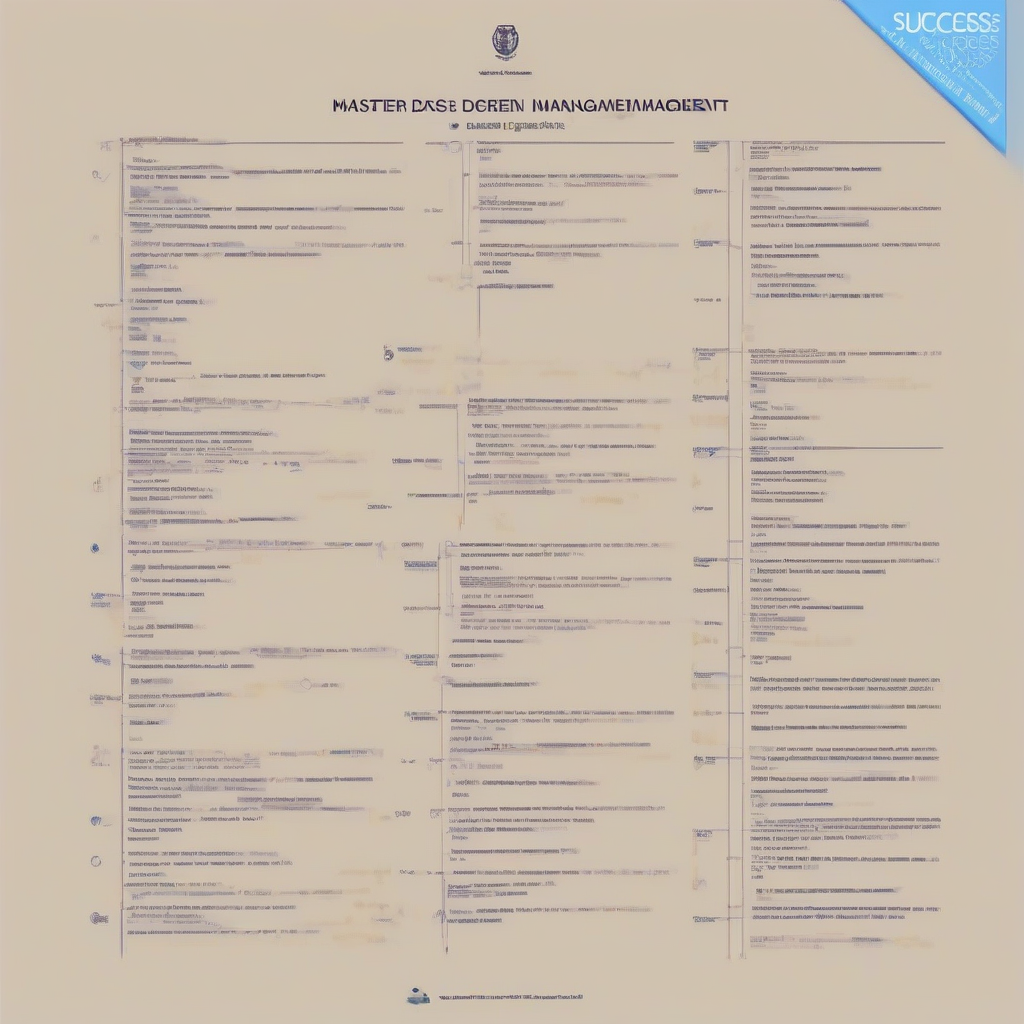Unlock Your Leadership Potential: A Comprehensive Guide to the Master’s Degree in Management
A Master’s degree in Management (often abbreviated as an MS in Management or MIM) is a postgraduate program designed to equip individuals with the advanced knowledge and skills necessary to excel in leadership roles across various industries. This comprehensive guide delves into the intricacies of this sought-after degree, exploring its curriculum, career prospects, admission requirements, and the overall value proposition.
What is a Master’s Degree in Management?
Unlike specialized Master’s degrees like an MBA (Master of Business Administration) which often focus on a specific area like finance or marketing, an MIM program offers a broader, more generalist approach to management principles and practices. It’s a versatile degree that caters to individuals from diverse academic backgrounds and career aspirations, providing them with a strong foundation in core management competencies.
- Focus on core management functions: MIM programs typically cover key areas such as strategic management, organizational behavior, operations management, financial accounting, and marketing fundamentals.
- Development of leadership skills: A significant emphasis is placed on cultivating leadership capabilities, including communication, teamwork, decision-making, and problem-solving.
- Broad applicability: The skills acquired are applicable across a wide spectrum of industries and organizational contexts, making it a valuable asset for career advancement.
- Flexibility and adaptability: The curriculum often allows for specialization in specific areas of interest, depending on the program’s structure and electives offered.
Curriculum and Course Structure
The specific curriculum can vary depending on the institution offering the program. However, common core subjects typically include:
- Strategic Management: Developing and implementing long-term strategies for organizational success.
- Organizational Behavior: Understanding human dynamics within organizations, including team management and leadership styles.
- Operations Management: Optimizing processes and resources to enhance efficiency and productivity.
- Financial Accounting: Interpreting financial statements and making informed financial decisions.
- Marketing Management: Understanding market dynamics, developing marketing strategies, and managing brand image.
- Project Management: Planning, executing, and controlling projects to achieve specific goals.
- Data Analytics for Management: Utilizing data-driven insights for improved decision-making.
- Change Management: Managing organizational transitions and transformations effectively.
- Innovation and Entrepreneurship: Fostering innovation and entrepreneurial thinking within organizations.
Many programs also incorporate practical elements, such as case studies, simulations, group projects, and potentially internships, to enhance learning and provide real-world experience.
Career Prospects and Job Opportunities
A Master’s degree in Management opens doors to a diverse range of career paths and job opportunities. Graduates can pursue roles in various sectors, including:
- Consulting: Management consulting firms frequently recruit MIM graduates for their analytical and problem-solving skills.
- Technology: The tech industry requires strong management capabilities to oversee projects and teams.
- Finance: Financial institutions value graduates with a strong understanding of financial principles and management skills.
- Healthcare: The healthcare sector needs efficient managers to navigate complex systems and regulations.
- Non-profit organizations: These organizations require skilled managers to optimize resource allocation and achieve their missions.
- Entrepreneurship: The degree provides a robust foundation for aspiring entrepreneurs to launch and manage their own businesses.
Specific job titles that MIM graduates might pursue include:
- Management Consultant
- Project Manager
- Operations Manager
- Marketing Manager
- Financial Analyst
- Product Manager
- Business Analyst
- Program Manager
Admission Requirements
Admission requirements vary across institutions, but generally include:
- Bachelor’s degree: A bachelor’s degree from an accredited university is a prerequisite.
- GMAT or GRE scores (sometimes): Some programs may require GMAT or GRE scores, although this is becoming less common for MIM programs.
- Letters of recommendation: Strong recommendations from professors or supervisors are crucial.
- Statement of purpose: A well-written statement outlining your career goals and reasons for pursuing the degree.
- Resume/CV: A detailed resume showcasing your work experience and academic achievements.
- English language proficiency tests (if applicable): International students may need to submit TOEFL or IELTS scores.
Program Formats and Duration
MIM programs are offered in various formats:
- Full-time programs: Typically completed within 1-2 years.
- Part-time programs: More flexible, allowing students to continue working while pursuing their studies.
- Online programs: Offer greater flexibility and accessibility for students who cannot attend in-person classes.
- Hybrid programs: Combine online and in-person learning components.
Choosing the Right Program
Selecting the appropriate MIM program requires careful consideration of several factors:
- Program reputation and accreditation: Research the program’s reputation and ensure it is accredited by a recognized body.
- Curriculum and specializations: Align the program’s curriculum with your career goals and interests.
- Faculty expertise: Look for programs with faculty who have extensive industry experience and research expertise.
- Career services: Assess the program’s career services resources, including career counseling and job placement assistance.
- Alumni network: A strong alumni network can be invaluable for networking and career opportunities.
- Cost and financial aid: Consider the program’s tuition fees and explore available financial aid options.
- Location and learning environment: Choose a location and learning environment that suits your preferences and lifestyle.
The Value Proposition of a Master’s in Management
Investing in a Master’s degree in Management offers significant returns. The enhanced skills and knowledge gained can lead to:
- Higher earning potential: Graduates often experience a substantial increase in their earning capacity.
- Career advancement opportunities: The degree opens doors to leadership roles and more senior positions.
- Increased job security: The skills acquired are highly transferable and in demand across various industries.
- Enhanced professional network: The program provides opportunities to build valuable connections with peers, faculty, and industry professionals.
- Personal and professional growth: The program fosters personal and professional development, leading to greater confidence and competence.
Conclusion (Placeholder – This section is excluded as per instructions)

